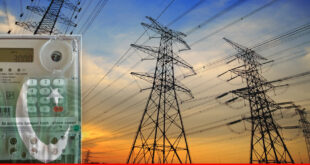Government not focused on exploiting potential of other indigenous resources like solar and coal
Energy is considered as lifeline of a country’s socio-economic and human development but its scarcity results in grinding halt to almost every sector of life.
Pakistan like other Asian countries is also faced with acute energy shortage, especially of electricity, the main source of energy. The electricity crisis did not emerge overnight because the issue had been prevailing since 2006 following the previous regime’s least interest to address this grave public and country’s problem. Ironically, the present PPP-led government has also failed to take pragmatic steps to overcome energy crises which are going from bad to worst.
Currently, Pakistan is dependent up to 60 percent of electricity generation through oil and gas that proved to be very expensive, owing to ever increasing prices of petroleum in the international market, and this phenomenon enlarged the ‘circular debt’ (a chain of furnace oil and generated electricity payments between generation companies and PEPCO, and oil companies and PEPCO) that ultimately left the electricity managers with no other option but to raise the power tariff for consumers.
In addition to increasing electricity through hydel component, a very in-expensive energy source, the government is not focused on exploiting potential of other indigenous resources like wind, solar and coal on priority basis, before stepping ahead for electricity import from neighbouring countries. After hydropower, the coal is another economically viable and long-term solution to balance the demand and supply chain of electricity in the country.
We are the luckiest that Allah Almighty has also blessed Pakistan with ample deposits of this ‘black gold’ measured up to 185 billion tones. Out of these black treasures, 3.3 billion tones are in proven/measured category and about 11 billion are indicated reserves, however, its bulk found in Sindh. The Thar Desert in Sindh province contains the largest coal deposit of about 850 trillion cubic feet spanning over 10,000 square kilometers, which is more than oil reserves in Saudi Arabia and Iran having collective quantity of approximately 375 billion barrels. As per the recent statistics worked out by the energy experts, the country’s energy demand would cross the figure of 100,000 MW by the year 2030.
In the given energy scenario in Pakistan, coal is the only available indigenous and inexpensive alternate resource, which has the potential to not only to ensure self-sufficiency in energy sector but also turn Pakistan into a power exporting country.
Experts are of the view that only two percent of the Thar Coal can generate 20,000 MW of electricity for next 40 years without a single second of load-shedding, and one can well measure that how much energy Pakistan would have on utilization of the entire coal reserve. While, the coal power generation will cost PKR 5.67 per unit against Rs 9.27 by the Independent Power Producers (IPPs).
The government needs to devise a plan to generate 10,000 MW of electricity from Thar Coal by the year 2020.
It may be noted that the failure of successive governments to resolve the power crisis and augment domestic power generation has compelled industrialists to relocate their units to foreign countries including Bangladesh, Sri Lanka, Malaysia and even Cambodia.
With no major power projects upcoming in near future, the peak season power shortage sometimes swells to over 7000MW.
Experts are of the view that Pakistan has not only to take immediate measures to overcome the energy crisis by resorting to short, mid and long-term measures, but it also needs to change its energy mix by shifting to the less expensive sources of power generation like hydro, coal-based and alternative sources.
They say that the Thar Coal Field, if developed, will yield over 200 billion tons of coal which, when used to produce electricity, will make Pakistan self-sufficient in power generation. Coal mining from Thar will also supplement various other industries. Owing to its huge potential, the government off late decided to exploit the huge resources and initiated different projects.
They said that the oil lobby was very strong in Pakistan and it is against their interest to allow any other means of power generation except oil.
 PAGE Blog Business Weekly Magazine
PAGE Blog Business Weekly Magazine

